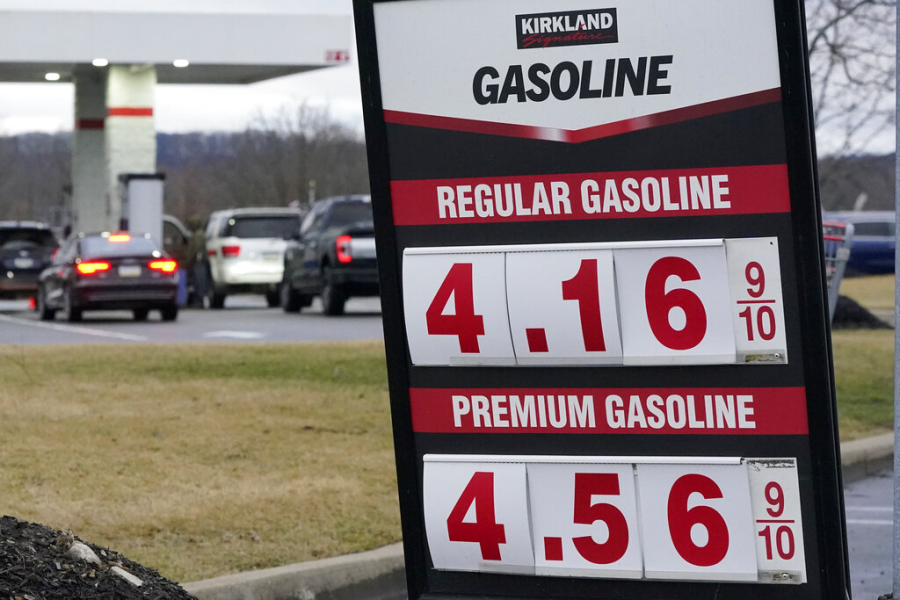OPINION: Putin’s Gasoline War
A gallon of regular unleaded gas is $4.16.9 at a Costco Wholesale store in Cranberry Township, Pa., Monday, March 7, 2022. (AP Photo/Gene J. Puskar)
Opinions expressed in the Op/Ed section of The Knight Crier are not necessarily reflective of the views of the entire staff of the KC.
At this point in the Russia-Ukraine war, the effects that the Russian-backed conflict will have on the U.S. and its citizens has already begun to show its consequences at home. One of these has been a rise on the already-rising price of gas, which has been reliably shooting up since the beginning of 2020. While it’s always easy to blame any economic issues on the current political administration, especially in the U.S.’ current political climate, there is inevitably more to the rise in energy prices – at least this time around.
Beginning with the basics of supply-and-demand economics, in the beginning of the lockdowns of 2020 at the start of the Covid-19 pandemic, gas prices began to rise and then fell, as travel began to be restricted at national levels. As people began to travel once again, prices rose and rose to the point where they were higher than previous levels, as people began traveling more than pre-pandemic levels.
When President Biden took office, he took action and implemented multiple economic stimulus policies that did raise inflation, therefore raising prices of goods and services, gas and oil included. Due to these policies, and his perceived attacks on oil and gas in favor of renewable, clean energy, many have blamed him and his administration for the rise in gas prices.
The situation in the Ukraine hasn’t helped matters. The relationship between Russia, the U.S., and the rest of the U.S.’ allies has been teetering since the Cold War. Ever since the invasion and human rights abuses of Ukraine by Russian forces has launched, widespread condemnation from nations supporting the U.S., as well as the U.S. itself, have been aired.
Whenever world tensions emerge, prices for necessary goods and services inevitably rise. Gas prices aren’t immune from this phenomenon, but the situation being related to Russia deepens matters. Russia’s bread and butter for their economy is oil and gas, and the U.S.’ gas supply is 8% of Russian oil. While this doesn’t sound like a lot in the long run, logistically, that 8% of oil would supply 18.3 million of the U.S.’s 226 million registered drivers.
The U.S. has taken swift action against Russia and its allies in response to its attacks on the Ukraine, including cutting off all Russian oil, coal, and gas shipments to the U.S.. Analysts say that the impact at home could lead to $5/gallon gas, $200 barrels of oil, and more, all situations the Biden administration is desperate to avoid.
Now, how could this be avoided? Despite the negative impacts on the climate, the U.S. could speed up domestic oil production, as clean energy magnate Elon Musk has called for. Yes, Elon Musk, head of Tesla, has called for the expedition of domestic drilling, despite climate issues, in order to combat rising prices on gas and oil.
Drilling domestically would add countless jobs and monetary, fiscal value to President Biden’s “Buy American” program, devoted to funding American-backed corporations and products. With this, American oil would both bring down the price of gas and oil while creating jobs here at home, and hurting the Russian economy.
Another potential solution to the gas crisis is the Gas Tax Holiday, a proposed 30% tax break across multiple states that would cut state and national taxes for at least a month. This would give gas prices a chance to swell downwards, while increasing domestic production.
All of these solutions are timely and would help consumers to fill up their tanks, while taking care of groceries and other day-to-day needs at the same time, but the fact of the matter is that Russia’s market volatility in the gas and oil market is unmatched in the marketplace. The U.S. needs to begin shifting its reliance for fuels from international partners to domestic, as well as beginning to shift mainstream focus to alternative sources of energy and transportation.


